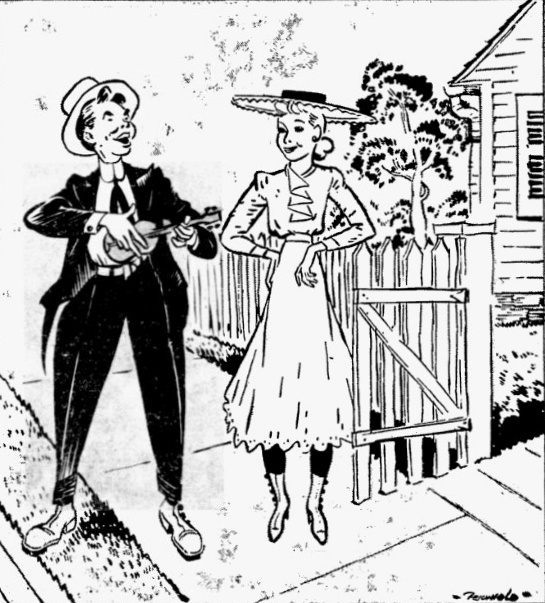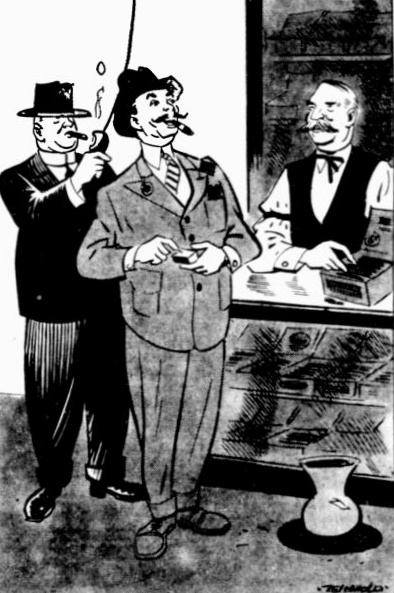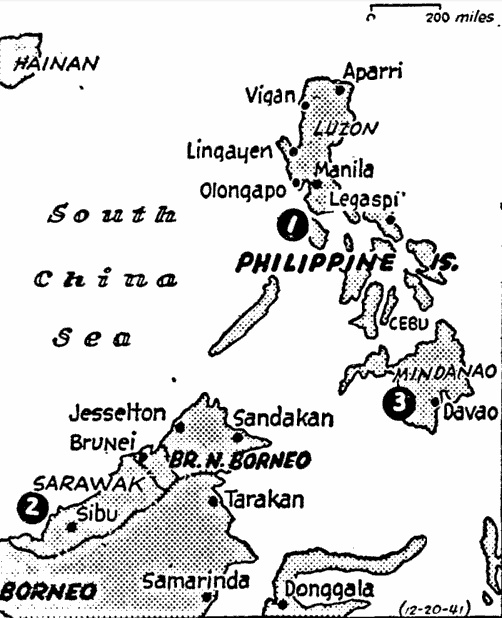
American of 1916 worries but little as war rages in Europe
Fourth article of a series.

1914 – Over There: In January, the first wireless message cracked between Germany and the United States. Kaiser Wilhelm sent his felicitations to President Woodrow Wilson… The Vaterland, a German threat to Britain’s mastery of Atlantic sea trade, made her maiden voyage in May. She was destined to make only two trips; interned at the start of the war, she became the Leviathan in 1917, transported thousands of American troops to France… A book appeared from the pen of a European author proving there could be no more war… A Serb student, Gavrilo Princip, shot and killed Archduke Francis of Austria and his wife, at Sarajevo, Bosnia, in June.
Events then moved with stunning swiftness. Austria declared war on Serbia in late July. Germany invaded France. Russians stormed into Germany. The treaty guaranteeing Belgium’s neutrality became a scrap of paper when Germany swept into Liège and Brussels. The British landed an expeditionary force on the continent.
1914 – Over Here: The winter was mild, and spring came early. Mr. Average American went out to the old barn that was now a garage and jacked his auto down from the blocks on which it had reposed during the cold weather (the majority of cars were put away in this manner at the first sign of deep snow). The young bloods tuned up their ukuleles and went a-wooing. They played and whistled “Aloha,” “My Mother’s Rosary,” “I Love You Truly.” The sentimental ballad was having another revival… Shortly after New Year’s, Henry Ford had announced a minimum wage of $5 for eight hours’ work. It caused a sensation in labor circles… But there was widespread unemployment, and “General” Jacob S. Coxey started a march from Massillon, Ohio, to Washington to demand that something be done about it… Booth Tarkington wrote Penrod, the story of a typical American boy. It is still widely sold today.
He’s not disturbed
Mr. Average American was excited but not disturbed by the outbreak of the war. His attitude was, succinctly and in his own language:
If those darn fools want to shoot each other, let ‘em go ahead.
Of course, he took sides, as is his custom whether it is checkers or fighting, and not all the support was on the side of the Allies.
But the invasion of Belgium stuck in his craw. A confirmed champion of the underdog (only a few years before, his own army and navy had battled to free Cuba), he was unable to comprehend to Germany’s ruthless trampling of a smaller and comparatively helpless nation.
It was his first introduction to the theory of right by might.
By the first of August, however, the war had assumed a role secondary to the pennant rush of the Boston Braves. In the last place on July 4, they had started a steady climb which put them on top at the end of the season. Then they defeated Philadelphia, four straight, in the World Series. Mr. Average American forgot everything else as he stood in front of the automatic scoreboard in the public square.
Lusitania sunk
1915 – Over There: The English won a major sea victory off the Dogger Banks… Germany threw up a submarine blockade around the British Isles… In March, at the Second Battle of Ypres, the Germans loosed poison gas for the first time. It caught a large force of Canadians… An American-owned ship, the Gulflight, was hit by a torpedo, killing two members of the crew… On May 7, the Lusitania was sunk by the submarine U-20. There were 124 Americans among the 1,195 victims.
1915 – Over Here: Mr. Average American could hardly wait for the next Charlie Chaplin movie to come to his favorite theater. Frequently, he would stay for two shows… The Birth of a Nation, starring Lillian Gish and Henry B. Walthall, one of the first full-length features, brought back the Reconstruction days of the Civil War and caused riots in Southern and border cities…
The Rev. Billy Sunday was preaching the gospel to the thousands in huge tabernacles… Jesse Willard knocked out Jack Johnson for the world’s heavyweight championship… The Eastland, an excursion steamer, turned over in the Chicago River, drowning 852 passengers.
The damage of the Gulflight had given Mr. Average American his first genuine shock of the war, but when the Lusitania went down, it was as though he had been struck across the face with a blacksnake whip.
Not war; murder
For the first time, he muttered to himself:
This isn’t war, it’s murder!
The great ship, which was termed by its owners, the Cunard Line, “the fastest and largest steamer now in Atlantic service,” was due to sail from New York on May 1. On the morning of her departure, directly beneath the Cunard advertisement, there was another “ad,” signed by the Imperial German Embassy in Washington. It read:
Travellers intending to embark on the Atlantic voyage are reminded that a state of war exists between Germany and her allies and Great Britain and her allies; that the zone of war includes the waters adjacent to the British Isles; that, in accordance with formal notice given by the Imperial German Government, vessels flying the flag of Great Britain, or any of her allies, are liable to destruction in those waters and that travellers sailing in the war zone on the ships of Great Britain or her allies do so at their own risk.
That was all. If Mr. Average American read it, there is little likelihood that he regarded its appearance beneath the notice of the Lusitania’s sailing as more than a coincidence. But seven days later, with the ship at the bottom of the sea, his anger rose to new heights.
Could have asked war
President Wilson, historians now agree, could have asked for war that very day and been assured of Mr. Average American’s support.
Some ascribed his reticence to Mr. Wilson’s long-lived distaste for the use of force; others placed a purely political stamp on his actions, pointing out that he was nearing the end of his term, was confronted with an election the following year and feared for his future if he led the country into war.
But there was no doubt of one thing: Mr. Average American’s temper in the spring of 1915 was such that he would have approved war with Germany. Instead, he sat back for months and waited while the White House and Germany exchange a series of diplomatic notes, each one serving to increase the tension and widen the breach. The break was inevitable.
1916 – Over There: The Germans opened a great offensive at Verdun… The first major naval engagement was fought at Jutland, the result still being a controversial point 25 years later… Lord Kitchener and his staff, bound for Russia, were lost with the cruiser Hampshire… David Lloyd George became England’s Prime Minister.
Conflict sneaks up
1916 – Over Here: The war was sneaking up on Mr. Average American, who was beset with a thousand spy scares (how familiar this sounds to the present generation) and much actual proof was unearthed that German agents were busily engaged in planting their own propaganda and even in acts of violence designed to sabotage American support for the Allies…
There were mysterious fires, and in July, a terrific explosion at the Black Tom Island docks in New Jersey did damage estimated at $22 million… In October, the submarine U-53 appeared in Newport Harbor. Her captain said he had come to pay his respects. After departing and passing the three-mile limit, she began sinking ships. It had a sobering effect on Mr. Average American, beneath the ocean as well as on the surface. He had not thought of this before.
On the platform “He Kept Us Out of War,” President Wilson was reelected over Charles Evans Hughes in November. The country went to bed on election night believing Hughes had won, discovered over its breakfast coffee that the California vote had kept Mr. Wilson in office.
That was the summer and Mr. Average American sent his boy to the Citizens’ Military Training Camp in Plattsburgh, New York, a controversial project that cost Maj. Gen. Leonard Wood a friendship of the administration and brought Theodore Roosevelt into sharp conflict with the government.
For preparedness
Wood and Roosevelt were outspoken proponents of preparedness, but found little encouragement in Washington. The Plattsburgh camp was their idea; to it went young men in all walks of life, the majority being professionals and businessmen who could afford to pay to learn to be soldiers. The organization was loose and lacking in authority, but out of it came many an officer who distinguished himself in France.
For his relaxation, Mr. Average American found the screen more and more to his liking. He had been a fiend for Miss Pearl White and her super-thriller serial, The Perils of Pauline. He was frankly in love with Mary Pickford. Black-haired Carlyle Blackwell caused his wife’s heart to flutter.
He had an auto, but the rearview mirror, the bumpers and the spare tire were “extras.” He was proud of his peg-top trousers, and when he went out socially, he put on a stiffly-starched collar. Shirts with attached collars were for picnics and the like.
Mrs. Mary Roberts Rhinehart, a Pittsburgher who was already known for her mystery novels, introduced Tish, and Old Judge Priest was created by Irvin Cobb. When a Man’s a Man, by Harold Bell Wright, kept a million lights burning into the night.
Sitting down to his Christmas dinner in 1916, Mr. Average American had to admit:
It had been a better year than some.
But it was only when he remembered there was still an ocean between himself and war that he wasn’t uneasy about the future.

